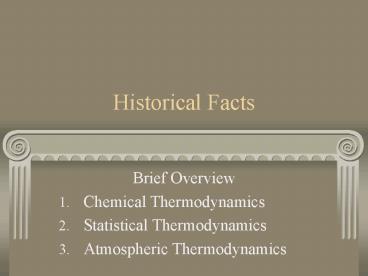Historical Facts - PowerPoint PPT Presentation
1 / 29
Title:
Historical Facts
Description:
Historical Facts. Brief Overview. Chemical Thermodynamics ... Director of the Institute of Technical Physics at the University of Gottingen in Germany ... – PowerPoint PPT presentation
Number of Views:38
Avg rating:3.0/5.0
Title: Historical Facts
1
Historical Facts
- Brief Overview
- Chemical Thermodynamics
- Statistical Thermodynamics
- Atmospheric Thermodynamics
2
Disclaimer!There are more disciplines/branche
s of Thermodynamics listed. However, the ones
covered are the more established branches with
more scientific credibility
3
Chemical Thermodynamics
- This is a mathematical study of the relationships
between heat and work in chemical reactions or
within physical changes in state while adhering
to the laws of thermodynamics - 1865 Rudolf Clausius, Mechanical Theory of Heat
and the Clausius-Clapeyron relation - J.H. Vant Hoff- Chemistry and Equilibrium
Thermodynamics? - Affinity
- Willard Gibbs- Other side of the coin (Did some
patchwork on Vant Hoffs work) - Chemical Potential
- Two schools of thought on the same branch of
Thermodynamics. Why?
4
Chemical Thermodynamics (Cont)
- Van der Waals (PV/TConstant, not enough). 1889
Waals to rescue with Equation of state for binary
mixtures - Chemists want something to satisfy non ideal
situations. G.N. Lewis answers call with the
methods of activities.
5
Atmospheric Thermodynamics
- A branch of thermodynamics that focuses on water
and its transformations.
6
Atmospheric Thermodynamics
- Beginnings in early 1880s with Sadi Carnot,
Emile Clapeyron, and Rudolf Clausius. - Clausius-Clapeyron Equation (not relation)
- Heinrich Hertz- Atmospheric Dynamic Diagram.
- Alfred Wegener- 1911 Thermodynamik der
Atmosphare - 1970s -Text Books on subject matter begin to
appear by credible scientists and becomes an
important tool to weather forecasting. - 1986- K. Emanuel- Carnot Engine and Hurricanes?
7
Statistical Thermodynamics
- This is thermodynamics on the microscopic level.
Its the study of the behaviors of thermodynamic
systems with respect to probability theory on the
microscopic level.
8
Statistical Thermodynamics
- Father- 1870 Ludwig Boltzmann (Austrian)
- 1877- "On the Relation Between the Second Law of
the Mechanical Theory of Heat and the Probability
Calculus with Respect to the Theorems on Thermal
Equilibrium" - Boltzmann Equation
9
Heat Transfer
10
Heat Transfer
- Heat-the transferred of energy from one object to
another due to a difference in temperature. - Heat Transfer- the science of the change in heat
in different circumstances. - Conduction
- Convection
- Radiation
11
Conduction
- Definition the transfer of heat from a higher
temperature to a lower temperature through the
particles of a material. - Solids, liquids, gases.
12
Jean Baptist Biot
13
Jean Baptiste Joseph Fourier
- Mathmatician and physcicist
- Theorie Analytique de la Chaleur
- Fouriers law of heat conduction
14
Convection
- Definition is the process of heat transfer
between a solid surface and a moving liquid or
gas. - Natural Convection
- Forced Convection
- Differences from Conduction
15
Radiation
- Definition-heat transfer through the emission of
electromagnetic waves which carry the heat away
from the object. - All objects emit radiation.
- Does not require a medium to transmit the energy.
16
Ernst Schmidt
- German scientist
- Innovator in heat and mass transfer.
- The Schlieren and Shadow Method
- The Graphical Difference Method for the
Unsteady Heat Condution - Aluminum Foil
17
Joseph Stefan
- Blackbody Radiation
- Stefan-Boltzman Law
18
Fluid Mechanics
19
Fluid Mechanics
- Fluid-from the French word meaning that which
flows - Mechanics-the study of motions of masses and the
forces that act on them - Fluid Mechanics-a science that deals with the
behaviors of fluids at rest or in motion and the
interaction of fluids with solids or other fluids
at the boundaries
20
Archimedes
- First known person to contribute to fluid
mechanics - Discovered the law of buoyancy
- Explained how a ship floats
21
Leonardo da Vinci
- Derived the equation for conservation of mass for
one-dimensional steady flow - His interest in fluid mechanics also led him to
design a submarine.
22
Isaac Newton
- Gave us the laws of motion
- He also explained viscosity of linear fluids
- Introduced Newtonian fluids
23
Leonhard Euler
- Derived the equations that relate velocity and
pressure to the density of the liquid - The equation was later improved by the
Navier-Stokes equations
24
Daniel Bernoulli
- Obtained the equation for incompressible flow
- Related the Conservation of Energy to fluid
mechanics
25
Osborn Reynolds
- Performed experiments to derive an equation that
compares to types of forces on a liquid - The equation shows whether the flow is laminar or
turbulent
26
Ludwig Prandtl
- Wrote Fluid Flow in Very Little Friction in 1904
- Director of the Institute of Technical Physics at
the University of Gottingen in Germany
27
Variables needed to define a fluid and its
environment
"Fluid Preliminaries." Efunda. 2006. Efunda. 3
Dec. 2006 lthttp//www.efunda.com/formulae/fluids/o
verview.cfmgt.
28
Aurora Borealis
29
Condensation































